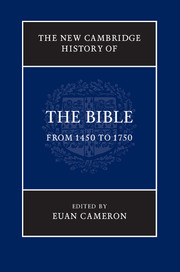Book contents
- Frontmatter
- Contents
- List of figures
- List of contributors
- Preface
- List of abbreviations
- Introduction
- PART I RETRIEVING AND EDITING THE TEXT IN EARLY MODERN EUROPE
- PART II PRODUCING AND DISSEMINATING THE BIBLE IN TRANSLATION
- PART III PROCESSING THE BIBLE: COMMENTARY, CATECHESIS, LITURGY
- PART IV THE BIBLE IN THE BROADER CULTURE
- PART V BEYOND EUROPE
- 33 The Bible in European colonial thought c. 1450–1750
- 34 Conquest and evangelisation: The Bible in colonial America (1500–1750)
- Afterword
- Select bibliography
- Select Bible bibliography
- Index
33 - The Bible in European colonial thought c. 1450–1750
from PART V - BEYOND EUROPE
Published online by Cambridge University Press: 05 August 2016
- Frontmatter
- Contents
- List of figures
- List of contributors
- Preface
- List of abbreviations
- Introduction
- PART I RETRIEVING AND EDITING THE TEXT IN EARLY MODERN EUROPE
- PART II PRODUCING AND DISSEMINATING THE BIBLE IN TRANSLATION
- PART III PROCESSING THE BIBLE: COMMENTARY, CATECHESIS, LITURGY
- PART IV THE BIBLE IN THE BROADER CULTURE
- PART V BEYOND EUROPE
- 33 The Bible in European colonial thought c. 1450–1750
- 34 Conquest and evangelisation: The Bible in colonial America (1500–1750)
- Afterword
- Select bibliography
- Select Bible bibliography
- Index
Summary
If there is a clear biblical reference to ‘colonial thought’, it is undoubtedly Jesus’ injunction to his disciples to ‘go and teach all nations, baptising them in the name of the Father, and of the Son, and of the Holy Spirit’ (Matt. 28:19). For the best part of its history, however, the church seems to have remained comfortably oblivious to this aspect of its divinely entrusted mission. It was not until well into the sixteenth century that Christians began to take seriously their role as ‘missionaries’ as the word is understood nowadays; that is, a specialised section of the church entrusted with the instruction and conversion of non-Christians through the careful exposition of a clear set of doctrines and beliefs. It would be tempting to interpret the church's previous comparative lack of interest as the result of wilful neglect; but this would ignore the way in which Christian thinkers came to understand the nature of the church's mission during the first centuries of her history. The tremendous formative importance of those centuries for the subsequent development of Christian thought would be impossible to exaggerate; so before our topic can be fruitfully addressed, it is important to have a clear idea of the main assumptions that arose at that time in relation to non-Christians.
The background
By the time of Constantine's conversion in 312 the church had survived the perils of heresy and schism that threatened its early history and had responded to the persecution of the imperial power by organising itself along the lines of a universal hierarchical society capable of standing against the pagan worldstate. From there it was but a small step to the recognition of the Christian faith as the official religion of the Roman Empire. Quite apart from any considerations of Constantine's sincerity, it was clear to everyone that the order and universality of the Christian church had turned the church into the ideal spiritual ally and complement to the universal empire.
- Type
- Chapter
- Information
- The New Cambridge History of the Bible , pp. 805 - 827Publisher: Cambridge University PressPrint publication year: 2016



